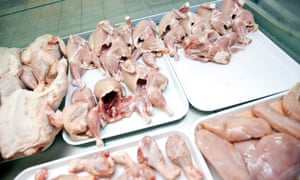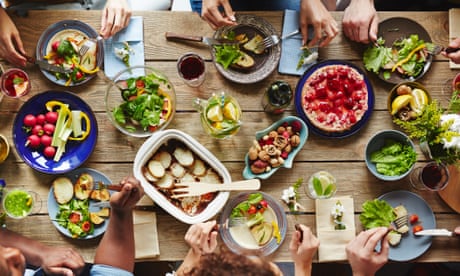Calls for food standards to be enshrined in law to avoid post-Brexit ‘betrayal’ of consumers
Fiona Harvey and Lisa O'Carroll Tue 25 Feb 2020

Campaigners fear chlorine-washed chickens could enter the UK market under new post-Brexit rules. Photograph: Alamy
Farmers have hit back at suggestions the government will allow imports of chlorinated chicken and other low-standard farm produce in trade talks with the US, escalating the row over post-Brexit food standards.
Minette Batters, the president of the National Farmers’ Union, will call for rules on minimum standards for imports to be enshrined in law, and insist that other countries must trade with the UK “on our terms”, rather than seek to water down food rules.
“We must not tie the hands of British farmers to the highest rung of the standards ladder while waving through food imports which may not even reach the bottom rung,” Batters will tell the NFU’s annual conference on Tuesday.
“If the government is serious about animal welfare and environmental protection, and doing more than any previous government, it must put legislation in the agriculture bill.”
Farmers were told last month by Theresa Villiers, the former secretary of state for environment, food and rural affairs, that chlorinated chicken – which the US wants to be allowed to export to the UK, where it is currently banned on health grounds – would be excluded from any trade talks.
Farmers fear they will face a flood of cheap imports undercutting high-standard British produce, and the potential for the EU to ban UK-produced food if standards were relaxed.

But the government refused to enshrine Villiers’ promises into the agricultural bill going through parliament, and she was sacked in the reshuffle. At the weekend, the new environment secretary, George Eustice, refused to repeat her assurances, reigniting the row and infuriating farmers.
Batters will present the dispute as an issue of public safety. “What is government waiting for?” she will ask. “What is more important to our economy, our health and our environment than the very food we eat?”
She will call for ministers to “show global leadership, insist that UK farms standards are the benchmark for climate-friendly farming around the world, and that whoever wants to trade with us trades on our terms. We must not allow those standards to be undermined by imports of goods which would be illegal for our farmers to produce here.”
Chlorinated chicken has grabbed the headlines but other practices pose a greater potential threat to human health. Within the EU, the use of antibiotics on farm animals falls under strict guidelines, which many other countries lack. Profligate use of antibiotics for meat production is linked to the evolution of superbugs, raising the spectre of a health “apocalypse” that could mean even routine operations become life-threatening.
Batters will say: “In Japan, Australia, China, Canada, Brazil, Malaysia and India, the use of antibiotics is permitted for growth promotion. This isn’t just about chlorinated chicken. This is about a wider principle.”
Kath Dalmeny, the chief executive of the Sustain alliance for better food and farming, accused the government of betraying consumers. “Just last year George Eustice said US imports would have to conform to ‘British law and British standards’ or the US could ‘kiss goodbye to any trade deal and join the back of the queue’,” she said.
“Now, it seems he is prepared to bend over backwards to make the case for the US and their hormone-injected, acid-washed, antibiotic-intensive, low-welfare chicken. This is an outrageous betrayal of the British people and deeply worrying for our farmers. The government should be leading the way in high-quality, high-welfare food, not softening up the public to make low-grade food more palatable.”
A government spokesperson said: “We have repeatedly been clear that we will uphold our high environmental, food safety and animal welfare standards outside the EU. The government will stand firm in trade negotiations to ensure our future trade deals live up to the values of farmers and consumers across the UK.”
Eustice is expected to use his speech to the conference on Wednesday morning to launch a consultation on the future of farm subsidies after the UK leaves the EU.
“We can all agree that we want British farming to be sustainable in the truest sense of the word, an industry which is profitable, competitive and productive while feeding the nation and taking care of our landscapes too,” he will say.
In the agriculture bill progressing through parliament, farmers have been promised a new system of environmental land management contracts, which will reward them for measures to protect public goods, such as water and air quality, cutting greenhouse gas emissions, and preserving wildlife and nature.
However, campaigners are concerned it contains many loopholes, which will reduce the environmental protections currently in operation under EU regulations.
Farmers and land managers will have 10 weeks to respond to the government’s proposals.
Farmers have hit back at suggestions the government will allow imports of chlorinated chicken and other low-standard farm produce in trade talks with the US, escalating the row over post-Brexit food standards.
Minette Batters, the president of the National Farmers’ Union, will call for rules on minimum standards for imports to be enshrined in law, and insist that other countries must trade with the UK “on our terms”, rather than seek to water down food rules.
“We must not tie the hands of British farmers to the highest rung of the standards ladder while waving through food imports which may not even reach the bottom rung,” Batters will tell the NFU’s annual conference on Tuesday.
“If the government is serious about animal welfare and environmental protection, and doing more than any previous government, it must put legislation in the agriculture bill.”
Farmers were told last month by Theresa Villiers, the former secretary of state for environment, food and rural affairs, that chlorinated chicken – which the US wants to be allowed to export to the UK, where it is currently banned on health grounds – would be excluded from any trade talks.
Farmers fear they will face a flood of cheap imports undercutting high-standard British produce, and the potential for the EU to ban UK-produced food if standards were relaxed.

But the government refused to enshrine Villiers’ promises into the agricultural bill going through parliament, and she was sacked in the reshuffle. At the weekend, the new environment secretary, George Eustice, refused to repeat her assurances, reigniting the row and infuriating farmers.
Batters will present the dispute as an issue of public safety. “What is government waiting for?” she will ask. “What is more important to our economy, our health and our environment than the very food we eat?”
She will call for ministers to “show global leadership, insist that UK farms standards are the benchmark for climate-friendly farming around the world, and that whoever wants to trade with us trades on our terms. We must not allow those standards to be undermined by imports of goods which would be illegal for our farmers to produce here.”
Chlorinated chicken has grabbed the headlines but other practices pose a greater potential threat to human health. Within the EU, the use of antibiotics on farm animals falls under strict guidelines, which many other countries lack. Profligate use of antibiotics for meat production is linked to the evolution of superbugs, raising the spectre of a health “apocalypse” that could mean even routine operations become life-threatening.
Batters will say: “In Japan, Australia, China, Canada, Brazil, Malaysia and India, the use of antibiotics is permitted for growth promotion. This isn’t just about chlorinated chicken. This is about a wider principle.”
Kath Dalmeny, the chief executive of the Sustain alliance for better food and farming, accused the government of betraying consumers. “Just last year George Eustice said US imports would have to conform to ‘British law and British standards’ or the US could ‘kiss goodbye to any trade deal and join the back of the queue’,” she said.
“Now, it seems he is prepared to bend over backwards to make the case for the US and their hormone-injected, acid-washed, antibiotic-intensive, low-welfare chicken. This is an outrageous betrayal of the British people and deeply worrying for our farmers. The government should be leading the way in high-quality, high-welfare food, not softening up the public to make low-grade food more palatable.”
A government spokesperson said: “We have repeatedly been clear that we will uphold our high environmental, food safety and animal welfare standards outside the EU. The government will stand firm in trade negotiations to ensure our future trade deals live up to the values of farmers and consumers across the UK.”
Eustice is expected to use his speech to the conference on Wednesday morning to launch a consultation on the future of farm subsidies after the UK leaves the EU.
“We can all agree that we want British farming to be sustainable in the truest sense of the word, an industry which is profitable, competitive and productive while feeding the nation and taking care of our landscapes too,” he will say.
In the agriculture bill progressing through parliament, farmers have been promised a new system of environmental land management contracts, which will reward them for measures to protect public goods, such as water and air quality, cutting greenhouse gas emissions, and preserving wildlife and nature.
However, campaigners are concerned it contains many loopholes, which will reduce the environmental protections currently in operation under EU regulations.
Farmers and land managers will have 10 weeks to respond to the government’s proposals.
No comments:
Post a Comment